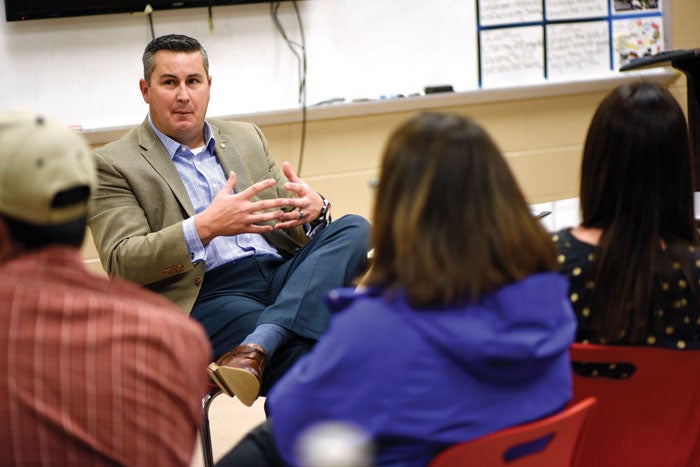Editorial: Hunter right to ask about perceptions
Published 12:00 am Wednesday, February 13, 2019

- JON C. LAKEY / SALISBURY POST School board member Dean Hunter moderates a small group discussion on the proposed school consolidation plans. The third community input meeting to discuss the proposed school consolidation was held at South Rowan high school on Thursday evening. The meeting format was similar to the previous meetings as Salisbury and East Rowan High schools. Thursday night meeting was a combined meeting for the South and Southeast school communities that were effected by the recent inclement weather. Landis, North Carolina 12/13/18
Should we enroll our schoolchildren in traditional English classes, asking them to write papers about book they’ve read, or, as South Rowan High School Principal Kelly Withers suggested Monday, have a business class co-taught with an English teacher who emphasizes communication skills needed to be successful in the business world?
Is it better to emphasize test-taking skills or how skills learned in the classroom apply to life after graduation?
It’s those sorts of questions that seem to be top-of-mind for Rowan Salisbury School System educators as they embark as a first-of-its kind renewal process that will allow a fundamental reshaping of everything from curriculum to budgets.
Across Rowan Salisbury Schools — from teachers to Superintendent Lynn Moody and the school board — the answer to questions about how to teach seems to trend toward practical knowledge rather than “book smarts.” And, for a broad swath of our community that may be the right call. Most graduating seniors in 2020 won’t need Algebra II, for example, in their careers.
While something must change about our education system, we’re not sure about the best method to create the transformation that’s needed. Because, even if renewal for Rowan Salisbury Schools creates a system that adequately fits the needs of employers while also supplying the right proportion of college-bound students, graduates will enter a world in which a much larger system still need to change.
Far too many high school graduates pursue a college degree and ultimately work in a career in which it’s not required. Among those, a too-large portion will have student loans, regardless of whether or not they completed a degree program.
Meanwhile, community college or a post-graduation job-training program is seen as a lesser option than enrolling in a four-year university among students and parents alike. So, students are pressured into chasing a four-year degree.
That must change.
And while we are optimistic about opportunities that renewal may bring for the school system and believe that RSS educators should be empowered to teach a curriculum that better prepares students for life after graduation, school board member Dean Hunter is right to ask how RSS’ curriculum will be perceived across the state and nation. Local employers may think more highly of local grads, but test scores are still a metric by which public school systems are judged. And colleges use test scores as one measure in the admissions process.
As Withers said, “I don’t know that any of us can really answer how the state is going to respond.”


